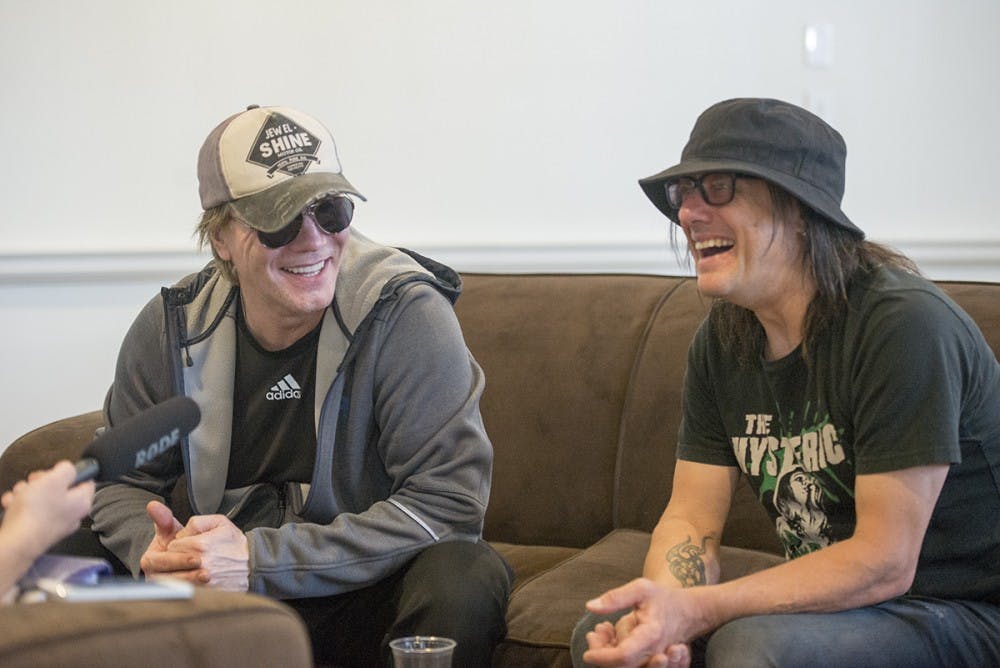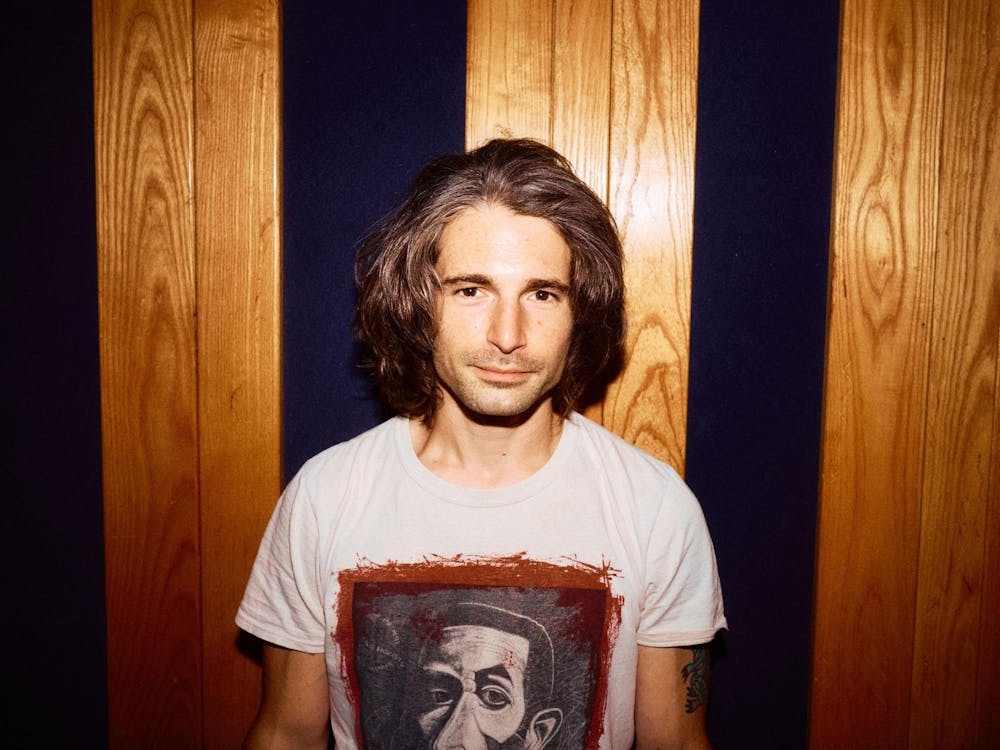In the past few months, Charlottesville has experienced jarring juxtapositions between political turmoil and massive artistic responses. The city was subjected to fatal white nationalist rallies — and weeks later, a larger-than-life, star-studded benefit concert was performed in retaliation, along with the Virginia Film Festival’s announcement that Spike Lee, one of the leading black voices in entertainment, would be visiting Charlottesville.
The University celebrates 200 years of existence with a multimedia event on the Lawn featuring significant voices in multiple realms of art — all amidst accusations of “200 years of white supremacy” from student groups and other members of the community.
My interview with Goo Goo Dolls founders John Rzeznik and Robby Takac showed how clearly Charlottesville represents a larger trend of political uncertainty plaguing the country.
“I’m feeling that energy here,” Rzeznik said late in the interview. “This is not a situation where we’re gonna be doing Jell-O shots and taking our shirts off — because it seems that there’s a certain level of reflection going on.”
“Which is awesome,” Takac added.
The three of us were sitting in brown plush chairs in one of the rooms of the Rotunda Friday afternoon, just hours before the band’s slated performance at the Bicentennial Launch Celebration. To my pleasant surprise, the band had agreed to answer a few questions about their role in the night’s festivities. The reason for this quickly became clear as the interview progressed — despite The Goo Goo Dolls being giants in the indie rock world, a household name for anyone who owned a radio in the ‘90s, the success seemingly never went to their heads.
In fact, Rzeznik seemed unsure that the band belonged at the event at all. When I asked their thoughts on performing alongside Andra Day and Leslie Odom Jr., Rzeznik displayed a humility more typical of a band just starting out, as opposed to one that has enjoyed enormous popularity for over 30 years.
“I’m terrified because they’re so talented — they’re so talented, and we’re a garage band,” Rzeznik said. “That’s where it started, and it may return to the garage. We’re just trying to hold our own up there.”
Despite their self-proclaimed “garage band” status, The Goo Goo Dolls’ music has a depth that is too often overlooked. I started the interview by attempting to get to the roots of their latest work, the five-track EP “You Should Be Happy.”
“It contains arguably some of your most powerful music,” I said. “What would you say the core of the EP is? Is there any overarching message that you want to get across to your listeners?”
As was the case for most of the questions in this interview, Rzeznik took the lead.
“Obviously ‘Tattered Edge / You Should Be Happy’ is a little tongue-in-cheek,” he said. “It’s definitely a commentary about the way things are shaping up in the world right now — in American culture. I hope I don’t sound like a bitter old man in it.”
Rzeznik went into more detail about the particular track.
“I don’t think that song is overtly political, but, you know, it’s maybe surreptitiously political,” he said. “There’s a deep division in the country, and people are very very vocal about it.”
He later amended the statement, saying that his music was more concerned with “social commentary” than politics. However, much of our conversation strayed to political topics — they seemed to be at the forefront of Rzeznik’s mind.
“Artists have been told in no uncertain terms that having an opinion is bad for business,” he said. “And my natural instinct to that is, ‘Well, f—k you.’”
Rzeznik went on to explain the inspiration behind some of the band’s most popular songs.
“A lot of my songs are just mistaken for flat-out, surface-level love songs,” he said. “And some of them are, but some of them aren’t. Some of them use the metaphor of a relationship to present something else that’s going on.”
When pressed about this statement, Rzeznik said that “Slide,” one of the band’s most beloved tracks, is often misinterpreted.
“[It’s] basically a commentary about a teenage girl getting pregnant and she and her boyfriend trying to figure out what to do … While being pressured by religion, by their families, by their community and by the pressures of the outside world and how things are going to change because of what happened in the heat of the moment,” he said.
The conversation moved to Rzeznik and Takac’s roles as entertainers.
“Doing a show, it’s like, you gotta balance fun with a message,” Rzeznik said. “Not that there’s always an intentional message there. I don’t go out every night to preach, that’s not my thing … I don’t have an agenda. I mostly wanna entertain people.”
On the subject on entertainment, I moved on to the specifics of the night’s show.
“How were you initially contacted about performing?” I asked.
“We’re never quite sure how the sausage gets made back there,” Takac said. “We got an offer and they told us about the event, and it sounded pretty special. We could get all our stuff here in time, so we thought it was a great idea.”
“This is a really big event,” Rzeznik added.
The conversation then focused in on the event itself — both its magnitude and its political context. Though The Goo Goo Dolls had never struck me as a remotely political band, “surreptitiously” or otherwise, Rzeznik made it clear that he had some very complex opinions on the topic.
“I mean, you have to vote, you have to work towards change,” Rzeznik said. “The people who are in your position, who are in college right now, have been left an enormous mess that they’re gonna have to clean up.”
This quickly shifted into a criticism of the Trump administration’s handling of the arts. Rzeznik had a lot to say about what he called “the inequality in this country,” referring to both social class differences and the increasing devaluation of the arts.
“The fact that education, music, art, public services — anything to help people rise out of poverty, or enrich the common Americans’ lives, is the first thing to be thrown away … For a bigger and better bomb,” Rzeznik said. “Or another tax cut for someone who couldn’t possibly spend all the money he has.”
Despite Rzeznik’s dissatisfaction with the country’s current political status, he seemed proud of the way in which the University is attempting to handle its complex history.
“It’s very cool to see that this is a remembrance of some turbulent times, and also the good times,” Rzeznik said. “Everything is like a family, and things evolve — relationships between people evolve. The past is very important to reflect on and learn from, but it’s also meant to be left in the past. Not forgotten, but put in its place.”
His talking points kept returning to the University, and particularly the students’ roles going forward.
“Your generation is gonna have to really address these issues — and quickly,” Rzeznik said. “Because ultimately, you guys are gonna be running the world, and it’s getting more and more difficult.”
The brief interview was unusual in multiple ways — as I spoke with Rzeznik and Takac, I had more of an impression that I was just chatting with concerned citizens of the community rather than giants of the indie rock world. Only a few details reminded me of the men’s rock star status — namely, Takac’s piercings and shoulder-length hair, and the fact that Rzeznik wore aviator sunglasses for the entire interview though we were indoors.
Rzeznik had some touching parting advice for students who may be feeling lost at this crossroads.
“Everyone should really just lock their arms and look forward and go … And hang onto each other,” he said.
It was a beautiful sentiment, one that can be used as a message of solace during this turbulent and uncertain time in the University’s existence. Art may not be capable of solving all the world’s problems, but it can be a great means of achieving at least some sort of unity.
Whatever may be in Charlottesville’s future, its residents — and particularly the students of the University — would do well to follow Rzeznik’s advice to “hang onto each other.” The city has some deep-seated and complex issues that must be addressed, but until the community is willing to join forces to tackle these problems, progression will be all but impossible.







